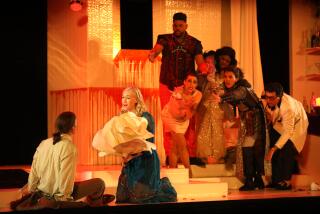‘Les Miserables’ is ambitious but overbearing, early reviews say
- Share via
“Les Miserables” the musical isn’t exactly known for its subtle pleasures. Everything about it is big, from the sprawling story of love and redemption in 19th-century France to the showstopping musical numbers.
On Christmas Day, British director Tom Hooper’s new adaptation of the musical (which is itself based on the Victor Hugo novel) promises to splash “Les Mis” on the big screen in spectacular fashion, but a number of early reviews say the film is dragged down by its own grandiosity.
Christy Lemire of the Associated Press says “Les Mis” is “as relentlessly driven as the ruthless Inspector Javert himself. It simply will not let up until you’ve Felt Something — powerfully and repeatedly — until you’ve touched the grime and smelled the squalor and cried a few tears of your own. It is enormous and sprawling and not the slightest bit subtle.” On the other hand, she adds, “It’s hard not to admire the ambition that drives such an approach, as well as Hooper’s efforts to combine a rousing, old-fashioned musical tale with contemporary and immediate aesthetics.”
Variety’s Justin Chang writes that “for all its expected highs, the adaptation has been managed with more gusto than grace.” He adds, “The effect of this mammoth 158-minute production can be as enervating as it is exhilarating. Blending gritty realism and pure artifice, shifting from solos of almost prayerful stillness to brassy, clunkily cut-together ensemble numbers, it’s an experience whose many dazzling parts seem strangely at odds.”
The high mark of the film for Chang (and other reviewers) is Anne Hathaway’s rendition of “I Dreamed a Dream,” which he calls “an extraordinary distillation of anguish, defiance and barely flickering hope in which the lyrics seem to choke forth like barely suppressed howls of grief.”
The Hollywood Reporter’s Todd McCarthy describes the film as “a gallery of stellar performers [waging] a Sisyphean battle against musical diarrhea and a laboriously repetitive visual approach.” The problem for McCarthy is one of monotony, as Hooper “stages virtually every scene and song in the same manner, with the camera swooping in on the singer and thereafter covering him or her and any other participants with hovering tight shots.” While the cast, which includes Hugh Jackman and Russell Crowe, displays plenty of singing prowess, “the majority of the numbers are pitched at the same sonic-boom level,” which becomes tiresome.
Richard Corliss of Time magazine warns that aside from an impressive opening scene, “you will not be cinematically edified. This is a bad movie.” According to Corliss, Hooper displays the same lack of nuance he did directing in the Oscar-winning “The King’s Speech,” in which he “felt obliged to hammer home the feelings in case anyone missed them.” Also problematic is that “some members of the cast don’t sound their best here.”
The Wrap’s Alonso Duralde doesn’t mince words either, writing that “Les Miserables” is “so overbearingly maudlin and distorted that it’s one of 2012’s most excruciating film experiences.” Like McCarthy, Duralde takes issue with the camera work, but that’s only part of the problem. As far as the performances, “Jackman and Hathaway are both playing to the back balcony, rather than to the camera lens that’s just inches away,” and Crowe is “singing on his tippytoes.”
Early criticism notwithstanding, “Les Miserables” could well prove to be a huge hit and an awards contender (particularly for Hathaway’s supporting turn). It’s worth noting, after all, that the musical originally opened to mixed reviews in London back in 1985, and it’s performed just fine since then.
ALSO:
In the moment on ‘Les Miserables’
‘Les Miserables’: Hugh Jackman, Eddie Redmayne went after roles
At ‘Les Miserables’ debut, a director who likes love and loathes lip-synching
More to Read
Only good movies
Get the Indie Focus newsletter, Mark Olsen's weekly guide to the world of cinema.
You may occasionally receive promotional content from the Los Angeles Times.










